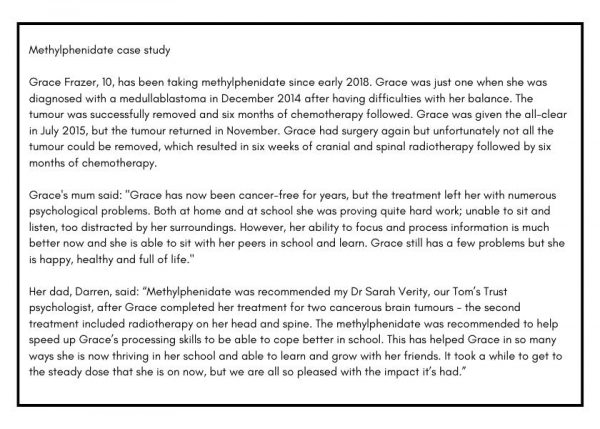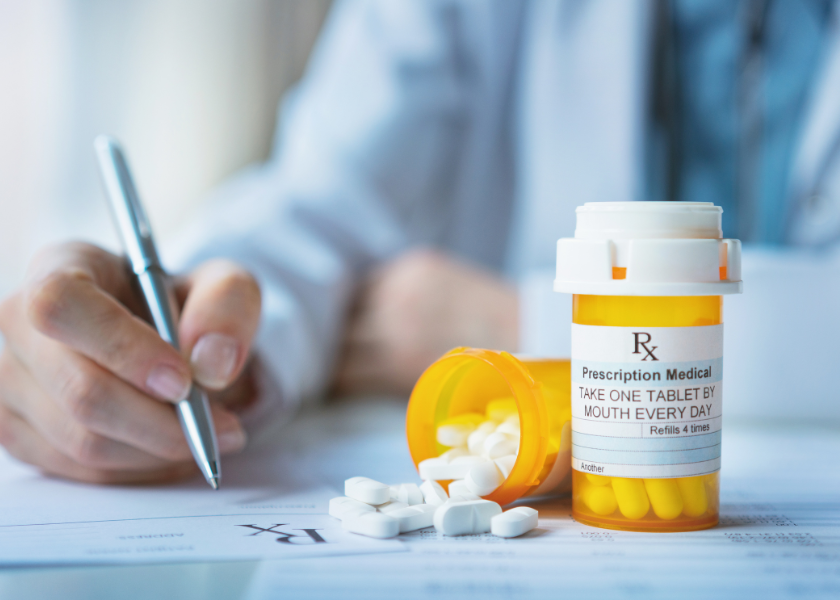A repurposed ADHD medication could change the lives of children who have survived a brain tumour, after new UK studies reveal improvements in brain functioning and improved quality of life for patients.
The two recent studies: Methylphenidate improves cognitive function and health-related quality of life in survivors of childhood brain tumours and Parental Perceptions of the Efficacy of Methylphenidate on Health‐Related Quality of Life in Survivors of Paediatric Brain Tumour, published the results of the drug methylphenidate, which is typically used to control ADHD symptoms, on children who had survived a brain tumour. A third child-led study, “I Feel Happy Again”: Methylphenidate Supports Health-Related Quality of Life in Survivors of Pediatric Brain Tumor, corroborated the findings.
The drug was taken for up to 12 months by 29 patients aged from five to 16, who all had a brain tumour and had either previous hydrocephalus (a build-up of fluid in the brain) or cranial radiotherapy treatment, with brain tumour types ranging from medulloblastomas and ependymomas, to low-grade gliomas and pineoblastomas.
The positive results combined measurable results using tests and reported results from the parents of the children. Overall, all results pointed to an increased quality of life for these children when taking methylphenidate, with improvements showing in aspects of attention, response times, academic function, emotional function and social functions, paired with a reduction in fatigue and increased happiness. This resulted in huge improvements in overall cognitive abilities and increased confidence for these children.
The studies were conducted by the Paediatric Neuro Oncology team at the Great North Children’s Hospital in Newcastle and partially funded by the children’s brain tumour charity Tom’s Trust.
Sarah Verity, lead author, said: “Due to improved medical treatments in children with brain tumours, more and more young people are

Lead author, Dr Sarah Verity
surviving, with an overall survival rate of approximately 85%. With 62% of these children being left with lifelong disabilities, it’s important that these children are given the best possible opportunity to fulfil their potential and have a good quality of life. We are very interested in the potential of this drug in survivorship, and we can see that it has had a positive impact on these children’s lives, with minimal side effects. We would like to see further funded research help us answer some of the outstanding questions we have about the use of this drug.”
Patients taking the drug showed a significant improvement in attention in all tests of selective visual attention from the ‘Test of Everyday Attention for Children’. A significant improvement was also shown with response times. The effect of methylphenidate on selective attention and processing speeds was more significant in this group of children than studies of children with ADHD and children with traumatic brain injury. 86% of patients were categorised as “responders” on at least one test of selective visual attention, demonstrating the potential for benefit to a significant sub-group of children with brain tumours.
As well as outcomes measured by psychometric assessments, other outcomes were self-reported by patients and their parents. Parent responses showed a statistically significant effect of methylphenidate on school function, emotional function and social function. In one of the studies, 70% of participants reported an increase in their child’s self‐esteem and confidence in themselves and their abilities following methylphenidate treatment. References made to self-esteem explicitly associated increased confidence in peer relationships with gains in cognitive function. Patients linked their new-found ability to participate in conversations with being able to “keep up” with the discussion and the ability to identify and articulate their own contribution, as well as process information in “real time”. It also allowed them to contribute more in class. An increase in academic performance was reported by 90% of participants, with a drastic reduction in functional difficulties.
In particular, gains were reported in the alleviation of fatigue in child reports. Post-brain tumour fatigue is recognised as one of the most commonly experienced symptoms reported by survivors, impacting the physical, cognitive, and emotional function of patients. Children in the current study reported that fatigue was alleviated by methylphenidate. One said: “I used to come home from work or school and be so tired I had to go to bed. Now, I can stay awake the whole day.”

Rebecca Wood, CEO of Tom’s Trust, said: “We are so thrilled to have been able to fund our first research studies as an addition to our core function of providing mental health care to children with brain tumours and their families, thanks to The Hospital Saturday Fund who kindly funded the project. We can see that to some participants this has been a miracle drug for them. We have started the process of our Tom’s Trust Survivorship Programme, a unique specialist psychology service for all UK brain tumour treatment centres to champion quality of life in paediatric brain tumour survivors and improve data analysis from clinical trials.”
To assess the long-term results of using the drug on overall intellectual capabilities and social, emotional and physical abilities, the patients continue to be studied over a longer period of time. The team look forward to submitting the findings of their three-year follow-up study in Autumn 2023.
Written by:
Jess joined Tom’s Trust in February 2021 as the charity’s first communications manager. She has previously worked in charity communications at the Internet Watch Foundation and Alzheimer’s Research UK, and has a background in national newspaper journalism, having worked at the Daily Mail and press agency SWNS.


